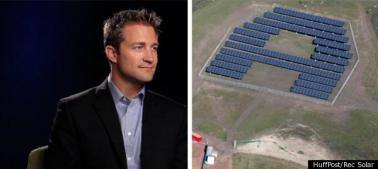
By Lynne Peeples
Spending less on one''s monthly energy bill — that''s appealing. Saving the environment at the same time, says Ryan Park, "that''s icing on the cake."
In an August video interview, Park, director of business development for California-based REC Solar and a recent finalist on the reality television show The Bachelorette, told Hu ffPost that he sees solar as an "important piece of our energy future."
Two months later, many critics would question such optimism. The recent failure of another California solar panel manufacturer, Solyndra, which received half a billion dollars in loan guarantees from the federal government before crashing, has left the viability of solar under intense scrutiny.
In a recent follow-up interview, Park acknowledged the Solyndra bankruptcy has "cast a shadow over the whole industry," but added that the response to a single company''s demise was "way overblown." He said Solyndra''s failure was "not indicative for the future real winners," suggesting the current state of the solar industry is analogous to technology industry during the dot-com era, when several companies rose rapidly while others experienced dramatic demises.
As Thomas Maslin, a senior analyst for the North American solar power sector with IHS Emerging Energy Research, told HuffPost''s Tom Zeller last month that such competition is just a sign of the solar industry "becoming more mature."
While Solyndra''s concept of a lightweight, quickly installable panel was initially attractive, Park thinks it "never had a chance," especially as the price of more conventional silicon panels plummeted. In the end, the more efficient technology won.
"It''s unfortunate that our government placed financial bets on the wrong technologies, but the good news is the industry as a whole is advancing rapidly down the cost curve," said Park, noting that during his 10 years in the business he''s seen the solar cell prices fall from around nine dollars a watt to below three dollars a watt.
"Imagine where we''ll be in 10 more" years, he added. "It''s exciting."
It should come as no surprise that Park''s house is fitted with solar panels and a tankless water heater. (People who watched the latest season of The Bachelorette may remember Park''s long-winded pitch of the latter technology while on a date with Ashley.) He also drives a Prius, which he said he plans to replace soon with an all-electric car.
As Park told HuffPost, studies have shown that over 30 percent of electric vehicle owners also have solar electric systems. If the two are paired — with the car, in effect, charged by the sun — then the cost of driving a mile is 80 percent less than traveling by gas-powered car.
"It makes financial sense and environmental sense," he said.
The solar industry still has a ways to go, according to Park. But he is hopeful, especially when thinking about today''s youth. He recently awarded a prize at the Solar Decathlon in Washington, D.C., and describes REC Solar''s school installations with infectious enthusiasm.
For the Athenian School, a prep school in Danville, Calif., Park''s team formed a large ''A'' out of solar panels on the hillside overlooking the school''s sports complex. "That''s going to be there for 30-plus years," he noted. "It''s like their school mascot, garnering energy."
"When I was growing up, I didn''t even know what solar was," said Park. "But for these students, solar is no longer the exception but rather something we should definitely have."
Article courtesy of huffingtonpost.com

